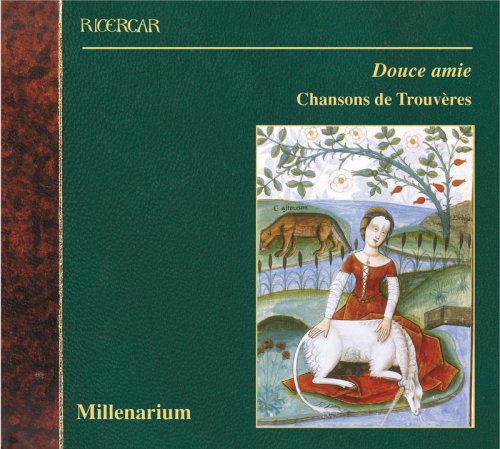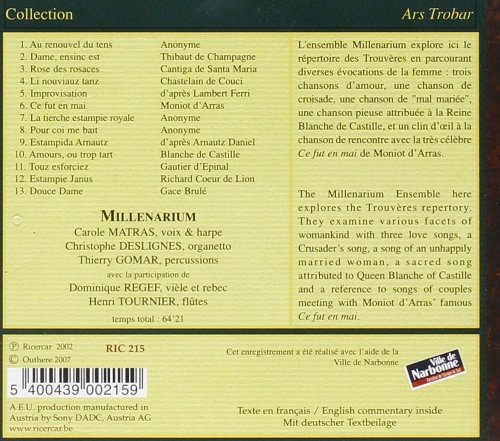Ensemble Millenarium - Douce amie: Chansons de Trouvères (2007)

Artist: Ensemble Millenarium
Title: Douce amie: Chansons de Trouvères
Year Of Release: 2007
Label: Ricercar
Genre: Classical
Quality: flac lossless
Total Time: 01:03:58
Total Size: 228 mb
WebSite: Album Preview
TracklistTitle: Douce amie: Chansons de Trouvères
Year Of Release: 2007
Label: Ricercar
Genre: Classical
Quality: flac lossless
Total Time: 01:03:58
Total Size: 228 mb
WebSite: Album Preview
01. Au Renouvel Du Tens
02. Dame, Ensinc Est
03. Rose Des Rosaces
04. Li Nouviauz Tanz
05. Improvisation
06. Ce Fut en Mai
07. La Tierche Estampie Royale
08. Pour Coi Me Bait
09. Estampida Arnautz
10. Amours, Ou Trop Tart
11. Touz esforciez
12. Estampie Janus
13. Douce Dame

The trouvères were the equivalent in northern France of the Provençal troubadours. This was a phenomenon which had arisen in the south and was already in decline by the time the likes of Gace Brulé (1159-1230), Moniot d'Arras (fl 1213-1239) and Thibaut de Champagne (1201-1253) – and the other half dozen or so makers represented on this excellent and highly enjoyable CD – were working. They sang (and most likely only wrote down later, if at all) in the northern dialects of Picardie, Champenois and Walloon. They also introduced new themes and forms… the serventois (the oïl (northern) equivalent of the sirventès, or "occasional" moral and political exposition), jeu-parti (dialog), serenade, the pastourelle and the Crusade song.
"Douce amie" from the ever-enterprising Ricercar label, is a collection of a dozen or so trouvères pieces, half and half, instrumental and vocal (where the texts are reproduced in the liner notes in oïl with verse translations in modern French and prose paraphrases, only – in English, German and Dutch). Of course we cannot be sure which instruments would have been used how, if any. Christophe Deslignes explains in the CD's booklet how Millenarium arrived at the decisions they did for scoring and arrangements. If, for example, it's known that a song was originally danced to, such as Au renouvel du tens, then the arrangement is different from that for a more somber lament, like Rose des rosaces.
Of course the music was improvised in the twelfth and thirteenth centuries; and so it is on the CD. In fact there is the almost obligatory contemporary improvisation (on a work after after Lambert Ferri) as an item (tr.5) in its own right; it has a greater sense of brooding and gloom than some of the other pieces. In fact variety, a nice spectrum from the melancholic to the sanguine, is a hallmark of this collection. These pieces don't have the sparkle and thrust of the songs of the troubadours. That's not a negative: there's majesty, reflection and conviction – particularly in the compelling singing of Carole Matras; her engagement in Touz esforciez, for instance, is remarkable...


![WDR Big Band - Big Band Bass (2025) [Hi-Res] WDR Big Band - Big Band Bass (2025) [Hi-Res]](https://www.dibpic.com/uploads/posts/2025-11/1762488895_jzhnl3hsh9y0a_600.jpg)
![AKBVR NAYO - Midnight Serenity (Instrumental) (2025) [Hi-Res] AKBVR NAYO - Midnight Serenity (Instrumental) (2025) [Hi-Res]](https://www.dibpic.com/uploads/posts/2025-11/1762396551_cover.jpg)


![Saied Silbak - Oud for Palestine (2025) [Hi-Res] Saied Silbak - Oud for Palestine (2025) [Hi-Res]](https://img.israbox.com/img/2025-11/09/w7hrg1bqzpdx29wt0z8i8g747.jpg)

